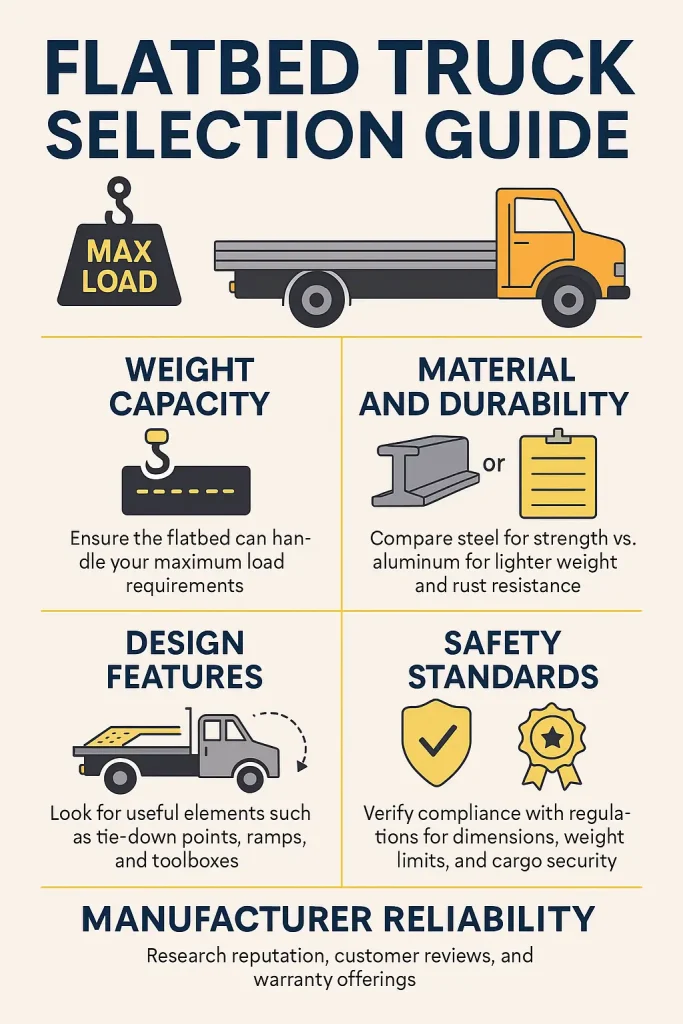When it comes to maximizing your truck’s capabilities, selecting the appropriate flatbed trailer is crucial. Fortunately, by evaluating key factors such as weight capacity, material durability, design features, legal requirements, and the manufacturer’s reputation, you can make an informed choice that suits both your professional needs and budget. With the right considerations in mind, you’ll ensure that your flatbed trailer enhances your vehicle’s efficiency and performance. Below, we delve into the integral aspects of choosing the perfect flatbed for your truck.
Assessing the Weight Capacity Needs for Your Flatbed Trailer
Weight capacity is one of the most important factors when selecting a flatbed trailer. The trailer must safely handle the maximum load your operations require without strain, as overloading increases safety risks and can damage the structure. Proper sizing also affects fuel efficiency and the lifespan of your truck, making it crucial to balance the trailer’s load capability with your vehicle’s power and towing limits.
Another key factor is the type of cargo. Dense or heavy materials may demand a stronger flatbed even if the load volume is smaller. Planning for potential changes in freight needs is wise, as choosing a trailer with slightly higher capacity provides flexibility, growth potential, and long-term adaptability.
Understanding the Importance of Flatbed Material and Durability
Steel and aluminum are the two primary materials used in flatbed trailers, each with distinct strengths. Steel provides superior durability and load-bearing capacity but adds weight and is more vulnerable to corrosion. Aluminum, on the other hand, is lighter, resists rust, and can improve fuel efficiency, though it may wear faster under heavy impact if not well maintained.
Construction quality also plays a key role in trailer longevity. Strong welding, solid joinery, and routine inspections help prevent damage from daily use and harsh conditions.
Evaluating Flatbed Design Features for Operational Efficiency
Design features play a vital role in the performance and usability of flatbed trailers. Innovative elements such as specialized tie-down points, loading ramps, and anti-slip floors can improve both efficiency and safety during operations. Modular components like removable sides or tarps add versatility for handling various cargo types, while toolboxes and integrated storage keep equipment organized and accessible. Even small details, including LED lighting and advanced locking mechanisms, make transport smoother and safer.
The best trailer designs are those tailored to operational needs. Customizable options, such as low-profile beds or unique storage solutions, ensure trailers match specific business requirements. When evaluating design, it’s important to consider not just present demands but also how features can support growth and larger-scale operations.
Meeting legal and safety standards is non-negotiable when operating a flatbed trailer. Regulations vary by state, covering dimensions, weight limits, and safety protocols that truck owners must follow to avoid penalties and ensure safe operations. Compliance extends beyond trailer construction to proper use, including secure cargo, balanced load distribution, and strict observance of road weight restrictions. Ongoing education in these areas is essential for anyone in the trucking industry.
When purchasing a flatbed, confirm the manufacturer meets all federal and state requirements, from design and materials to maintenance standards. Liability insurance and warranty plans further protect owners, offering peace of mind and signaling a manufacturer’s confidence in the trailer’s safety and reliability.
Investigating the Reputation and Reliability of Flatbed Manufacturers
The reputation and reliability of flatbed manufacturers are critical when choosing a trailer. Established companies often deliver durable products backed by strong customer service. Investigating their track record through testimonials, references, or case studies can reveal how well their trailers perform in real-world conditions. A manufacturer’s history in the industry also reflects its ability to adapt to evolving market needs, with years of experience often translating to product consistency and company stability.
Equally important is after-sales support, which includes warranties, maintenance resources, and responsive customer service. Reliable manufacturers also demonstrate commitment to innovation, using research and development to integrate advanced features that improve safety, efficiency, and compliance with industry standards.
Overall, the journey of selecting the perfect flatbed trailer involves an attentive overview of several key factors. Assessing weight capacity needs, understanding material and durability, evaluating design features, navigating legal requirements, and investigating manufacturer reliability all contribute to making an informed decision. These considerations not only enhance your operational efficiency but also ensure safety, compliance, and long-term satisfaction with your investment.





